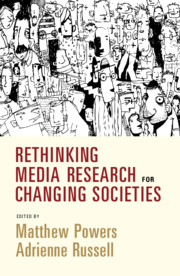Book contents
- Rethinking Media Research for Changing Societies
- Communication, Society and Politics
- Rethinking Media Research for Changing Societies
- Copyright page
- Contents
- Figure
- Contributors
- Acknowledgments
- 1 Introduction
- Part I Living in a Datafied World
- Part II Journalism in Times of Change
- Part III Media and Problems of Inclusion
- Part IV Engagement with and through Media
- Part V The Role of Scholars
- 12 What Is Communication Research For? Wrestling with the Relevance of What We Do
- 13 Communication as Translation
- 14 What Are We Fighting For? Academia or the Humility of Knowledge
- Epilogue
- Other Books in the Series (continued from page ii)
- References
12 - What Is Communication Research For? Wrestling with the Relevance of What We Do
from Part V - The Role of Scholars
Published online by Cambridge University Press: 18 September 2020
- Rethinking Media Research for Changing Societies
- Communication, Society and Politics
- Rethinking Media Research for Changing Societies
- Copyright page
- Contents
- Figure
- Contributors
- Acknowledgments
- 1 Introduction
- Part I Living in a Datafied World
- Part II Journalism in Times of Change
- Part III Media and Problems of Inclusion
- Part IV Engagement with and through Media
- Part V The Role of Scholars
- 12 What Is Communication Research For? Wrestling with the Relevance of What We Do
- 13 Communication as Translation
- 14 What Are We Fighting For? Academia or the Humility of Knowledge
- Epilogue
- Other Books in the Series (continued from page ii)
- References
Summary
This chapter examines the field’s double-sided struggle for relevance: How media studies gets lost among academic disciplines, on one side, and how it fails to connect with publics, on the other. Seth Lewis scrutinizes the disconnect between the field of media studies and people’s deeply mediated lived experience. He approaches the topic three ways: First, conceptually, considering what questions scholars are asking and not asking as a way to explore the assumptions, worldviews, and theories driving the research that does and does not get done. Second, methodologically, delving into how scholars ask questions, to which groups of people, and gathering what kinds of data. Third, communicatively, asking for whom scholars undertake their work, looking particularly at how research is being communicated to multiple audiences and with what normative aims. Lewis highlights sources of disconnection by exploring well-researched media topics of central concern to publics – media bias, information inequality, and religious faith. He demonstrates the field’s failure to provide the public with satisfactory responses.
Keywords
- Type
- Chapter
- Information
- Rethinking Media Research for Changing Societies , pp. 171 - 183Publisher: Cambridge University PressPrint publication year: 2020
References
- 2
- Cited by

